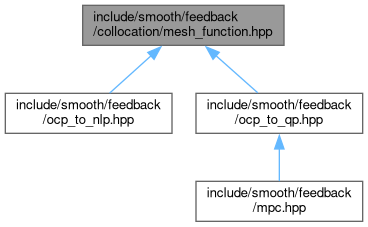Evaluate transform-like functions and derivatives on collocation points. More...
#include <Eigen/Dense>#include <Eigen/Sparse>#include <smooth/diff.hpp>#include "mesh.hpp"#include "smooth/feedback/utils/sparse.hpp"

Go to the source code of this file.
Classes | |
| struct | smooth::feedback::MeshValue< 0 > |
| Result of Mesh function. More... | |
| struct | smooth::feedback::MeshValue< 1 > |
| Result and first derivative of Mesh function. More... | |
| struct | smooth::feedback::MeshValue< 2 > |
| Result, first, and second derivatives w.r.t. collocation variables. More... | |
Functions | |
| template<uint8_t Deriv> | |
| void | smooth::feedback::set_zero (MeshValue< Deriv > &mv) |
| Reset MeshValue to zeros. More... | |
| template<uint8_t Deriv, diff::Type DT = diff::Type::Default> requires (Deriv <= 2) | |
| void | smooth::feedback::mesh_eval (MeshValue< Deriv > &out, const MeshType auto &m, auto &f, const double t0, const double tf, std::ranges::range auto &&xs, std::ranges::range auto &&us, bool scale=false) |
| Evaluate function over a mesh. More... | |
| template<uint8_t Deriv, diff::Type DT = diff::Type::Default> requires (Deriv <= 2) | |
| void | smooth::feedback::mesh_integrate (MeshValue< Deriv > &out, const MeshType auto &m, auto &f, const double t0, const double tf, std::ranges::range auto &&xs, std::ranges::range auto &&us) |
| Evaluate integral over a mesh. More... | |
| template<uint8_t Deriv, diff::Type DT = diff::Type::Default> requires (Deriv <= 2) | |
| void | smooth::feedback::mesh_dyn (MeshValue< Deriv > &out, const MeshType auto &m, auto &f, const double t0, const double tf, std::ranges::range auto &&xs, std::ranges::range auto &&us) |
| Evaluate dynamic constraints over a mesh (differentiation version). More... | |
Detailed Description
Evaluate transform-like functions and derivatives on collocation points.
Definition in file mesh_function.hpp.
Function Documentation
◆ mesh_dyn()
requires (Deriv <= 2)
| void smooth::feedback::mesh_dyn | ( | MeshValue< Deriv > & | out, |
| const MeshType auto & | m, | ||
| auto & | f, | ||
| const double | t0, | ||
| const double | tf, | ||
| std::ranges::range auto && | xs, | ||
| std::ranges::range auto && | us | ||
| ) |
Evaluate dynamic constraints over a mesh (differentiation version).
- Template Parameters
-
Deriv differentiation order (0, 1, or 2) DT inner differentiation method (used to differentiate f)
For interval \(j\) with nodes \(\tau_i\) and weights \(w_i\) the corresponding dynamic constraints are a block of the form
\[ \begin{bmatrix} w_0 \left( f\left(t_0 + (t_f - t_0) \tau_0, x_0, u_0\right) - \sum_{k=0}^{N_j} D_{k, 0} x_k \right) \\ \vdots \\ w_{N_j-1} \left( f\left(t_0 + (t_f - t_0) \tau_{N_j-1}, x_{N_j - 1}, u_{N_j - 1}\right) - \sum_{k=0}^{N_j} D_{k, N_j-1} x_k \right) \end{bmatrix}, \]
where \(D\) is the interval differentiation matrix (see interval_diffmat() in Mesh).
This function returnes all such blocks stacked into a 1D vector.
If DT > 0 derivatives w.r.t. t0, tf, {xi} and {ui} are returned.
- Parameters
-
out result structure m mesh f right-hand side of dynamics t0 initial time parameter tf final time parameter xs state parameters {xi} us input parameters {ui}
Definition at line 452 of file mesh_function.hpp.
◆ mesh_eval()
requires (Deriv <= 2)
| void smooth::feedback::mesh_eval | ( | MeshValue< Deriv > & | out, |
| const MeshType auto & | m, | ||
| auto & | f, | ||
| const double | t0, | ||
| const double | tf, | ||
| std::ranges::range auto && | xs, | ||
| std::ranges::range auto && | us, | ||
| bool | scale = false |
||
| ) |
Evaluate function over a mesh.
- Template Parameters
-
Deriv differentiation order (0, 1, or 2) DT inner differentiation method (used to differentiate f)
Computes the expression
\[ \begin{bmatrix} f(t_0 + (t_f - t_0) \tau_0, x_0, u_0) \\ f(t_0 + (t_f - t_0) \tau_1, x_1, u_1) \\ \vdots \\ f(t_{N-1} + (t_f - t_0) \tau_{N-1}, x_{N-1}, u_{N-1}) \end{bmatrix}. \]
If DT > 0 derivatives w.r.t. t0, tf, {xi} and {ui} are returned.
- Parameters
-
out result structure m mesh f integrand t0 initial time parameter tf final time parameter xs state parameters {xi} us input parameters {ui} scale scale values with quadrature weights
Definition at line 116 of file mesh_function.hpp.
◆ mesh_integrate()
requires (Deriv <= 2)
| void smooth::feedback::mesh_integrate | ( | MeshValue< Deriv > & | out, |
| const MeshType auto & | m, | ||
| auto & | f, | ||
| const double | t0, | ||
| const double | tf, | ||
| std::ranges::range auto && | xs, | ||
| std::ranges::range auto && | us | ||
| ) |
Evaluate integral over a mesh.
- Template Parameters
-
Deriv differentiation order (0, 1, or 2) DT inner differentiation method (used to differentiate f)
This function approximates the integral
\[ \int_{t_0}^{t_f} f(s, x(s), u(s)) \mathrm{d} s. \]
by computing the quadrature
\[ (t_f - t_0) \sum_{i = 0}^N w_i f(t_0 + (t_f - t_0) \tau_i, x_i, u_i). \]
If DT > 0 derivatives w.r.t. t0, tf, {xi} and {ui} are returned.
- Parameters
-
out result structure m mesh f integrand t0 initial time parameter tf final time parameter xs state parameters {xi} us input parameters {ui}
Definition at line 275 of file mesh_function.hpp.
◆ set_zero()
| void smooth::feedback::set_zero | ( | MeshValue< Deriv > & | mv | ) |
Reset MeshValue to zeros.
If sparse matrices are compressed the coefficients are set to zero, otherwise coefficients are removed but memory is kept.
Definition at line 80 of file mesh_function.hpp.